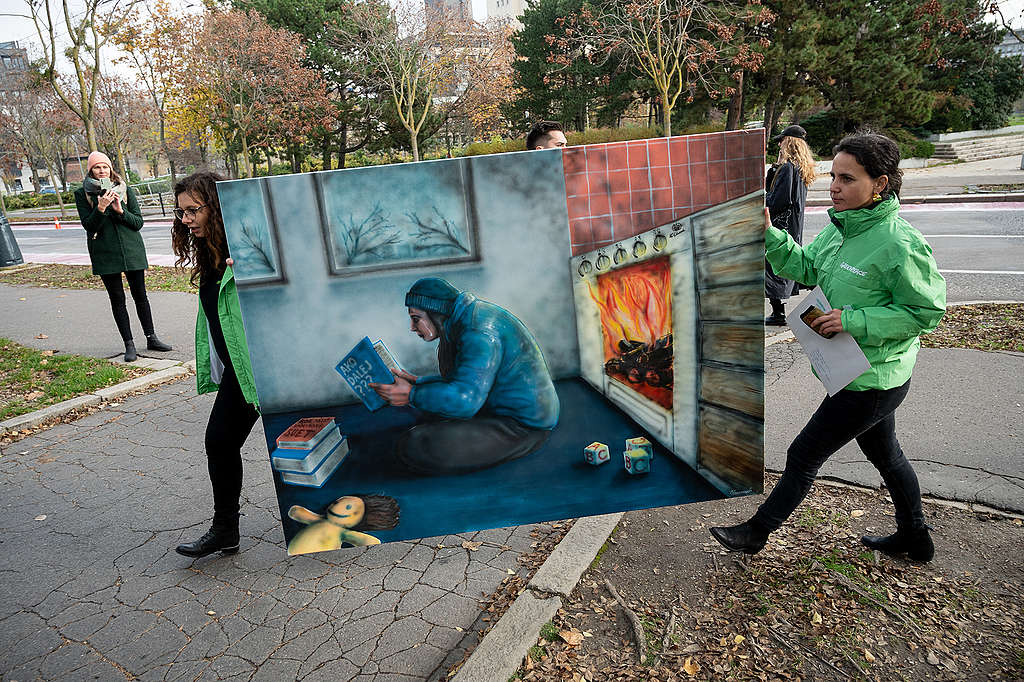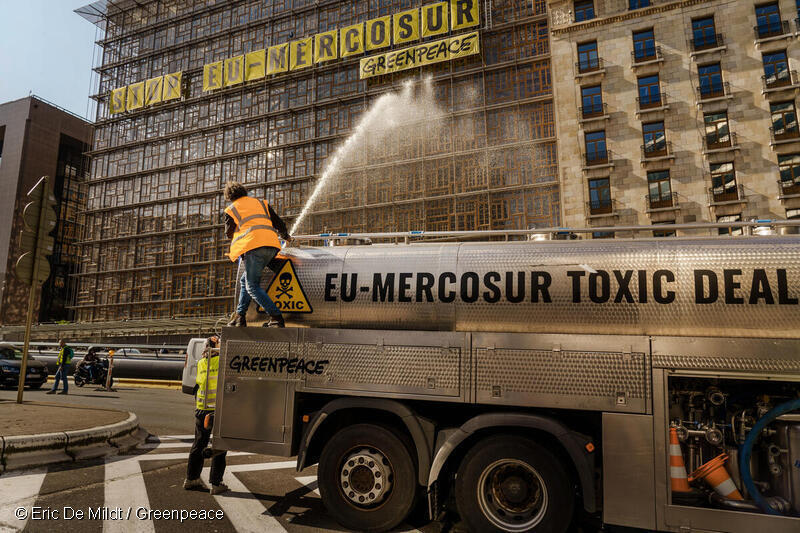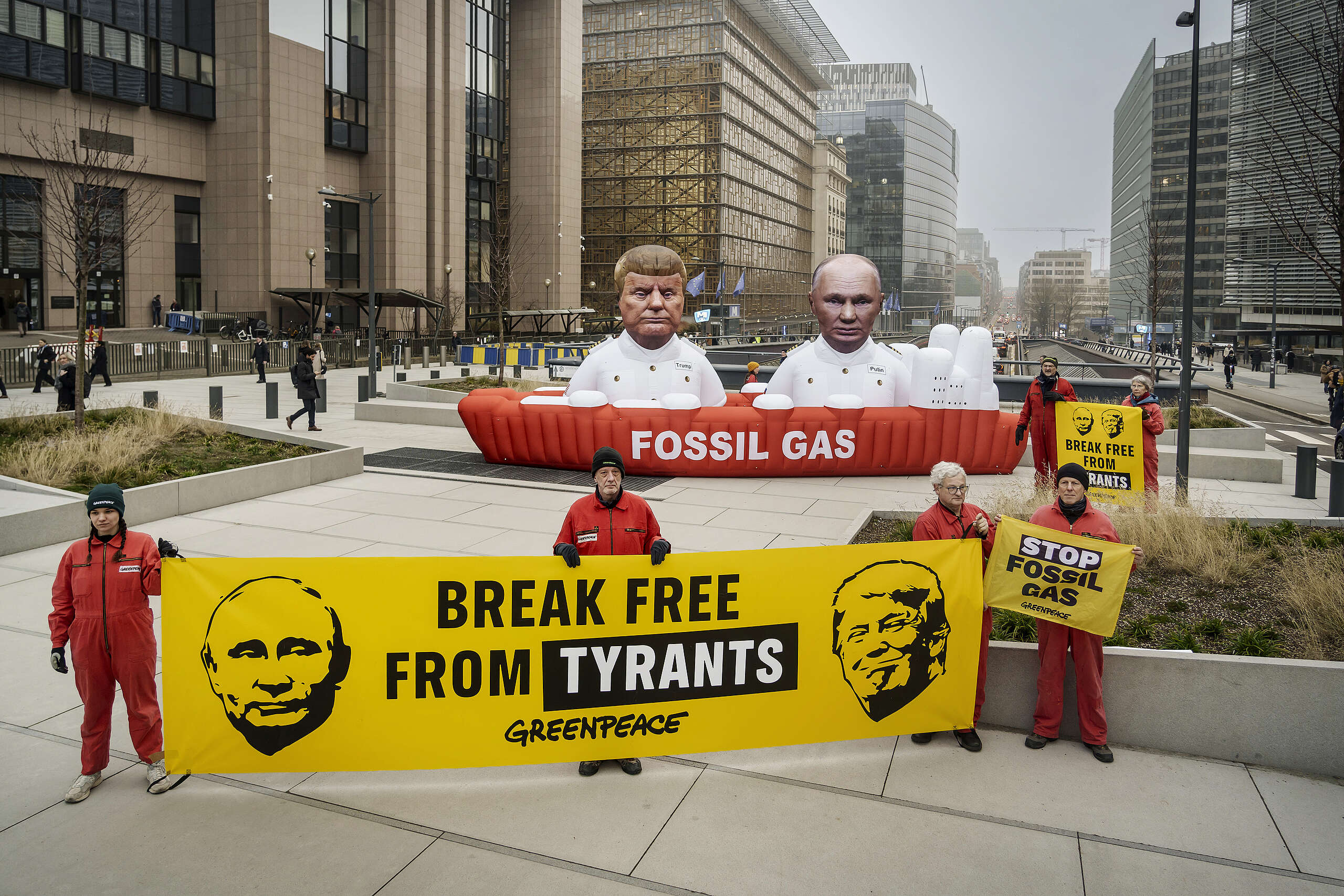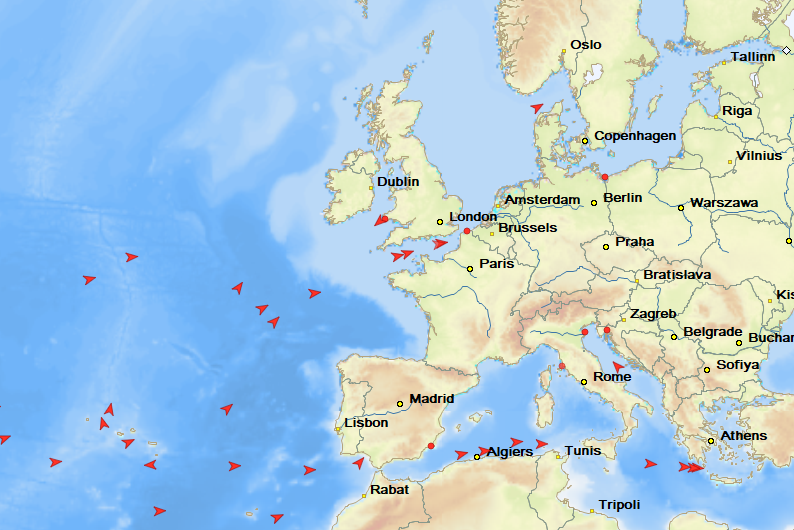
Mehmet Bulut is an energy analyst with Greenpeace International. Silvia Pastorelli is a climate and energy campaigner at the Greenpeace European Unit. This piece first appeared in Fondation Abbé Pierre’s “Manifesto for a Ban on Energy Disconnections in Europe.“ Photo credit: Tomas Halasz / Greenpeace.
Access to enough clean and modern energy to meet one’s basic needs is essential for human well-being, and should be treated as a fundamental right. Despite this, there were 775 million people without access to electricity in the world in 2022, located mostly in Africa and Asia. Whilst more pronounced in developing contexts, energy poverty is not a problem limited to the global south, it affects millions of people in Europe and has been greatly exacerbated by the energy crisis.
According to the European Poverty Research Network, more than 80 million Europeans are struggling to pay their energy bills on time and keep their homes adequately warm and free of damp and mould. In one of the richest regions in the world, millions of people are being pushed into energy poverty by skyrocketing energy prices, either through being disconnected from energy services or having to choose between heating and eating. Meanwhile, fossil fuel companies are collecting obscene profits. In spring 2022, shortly after the full-scale Russian invasion of Ukraine, a Eurofound survey revealed that 16% of people in the EU reported being in arrears of their utility bills, with numbers as high as 50% in Greece.
People that are already disadvantaged are more susceptible to energy poverty. In the same survey, 45% of Europeans reported having difficulties to make ends meet and expressed worries that they will not be able to pay their utility bills in the next three months. In Czechia, if you make the minimum wage, you would have to work 65 days to cover your annual energy bills, the highest number in the European Union, and in Greece and Estonia 54 days.
Left in the dark
Recognising that Europeans are suffering from energy poverty is not enough. As the energy crisis grows into a humanitarian crisis, there is no comprehensive data on how many people in Europe are cut off from energy services and left in the dark and cold. In order to understand the real extent of the problem, we need to collect detailed data on current disconnections and develop policies that are up to the task of addressing energy poverty effectively, in each country and at the EU level. Before the Covid-19 pandemic, voluntarily reported disconnection rates due to non-payment of energy bills reached as high as 4% of household customers of electricity in Italy, followed by Greece with just under 4%, while around 2.5% of household customers in the two countries received gas disconnection notices the same year.
The legal process – the minimum duration and the number of warnings required – for disconnection in case of non-payment varies greatly between EU countries. For electricity, 10 working days after the first warning are enough to disconnect an electricity customer in Poland, whereas in Latvia it could be as little as 5 working days for gas. Several European countries also do not have a set minimum amount for disconnection, meaning that households can be served a disconnection notice even for extremely low amounts of energy use. In most cases, those who are disconnected have to pay a fee for being disconnected from the network which can be over 130 Euros or equivalent. This inhumane practice charges people a fee, to abandon them in darkness or cold and there is often the added cost of a reconnection fee to restore their energy supply.
Energy poverty kills
Not being able to pay your bills also has severe health impacts. More people die in winter, primarily due to energy poverty, with several deaths directly linked to energy disconnections. According to the World Health Organization, indoor cold kills 58,000 people in the EU each year. Causes include life threatening conditions like hypothermia, or a dependence on electronic devices to survive (i.e. oxygen machines), or by fire or carbon monoxide poisoning. In Spain, more people are dying of energy poverty than road accidents. There is also a strong association between energy poverty and worsening health status, as well as higher use of health services and medications, which put a strain on both energy poor households’ finances and on healthcare systems. European countries have some of the world’s highest rates of “excess winter mortality”: 29.4% in Malta, 28% in Portugal, 23.6% in Cyprus, 20.6% in Spain, 19.7% in Ireland and 18.6% in the UK. Specific to disconnections, it has been reported that recent disconnections due to non-payment have led to the hospitalisations of clinically vulnerable people, which not only threaten the lives of these individuals, but also put a strain on the public healthcare systems.
This situation is further worsened by the dire state of the majority of buildings in the EU: around 75% of them are energy inefficient. In 2019, over 30 million Europeans were not able to keep their homes adequately warm – almost 7% of the total EU population. These difficult conditions have been exacerbated by the energy crisis and a massive increase in the cost of living. Additionally, 14.8% of Europeans live in leaky, damp houses, whose conditions are made even worse by lack of proper heating, cooling, and ventilation. According to the World Health Organization, the health impacts of such inadequate housing can directly affect people’s health from cardiovascular diseases to asthma. Inadequate housing in the EU27 and the UK is estimated to cost €194 billion in healthcare costs, in which energy poverty plays an important role. Having unconditional access to enough energy to meet people’s basic needs and to decent, well insulated housing would not only push down energy costs, but also eliminate many of the health risks associated with energy poverty.
Universal basic energy
Greenpeace believes that everyone should have access to affordable clean energy coming from renewable energy resources. Being able to meet basic needs like heating and cooking should not be considered a luxury. Governments have a duty to guarantee access in a way that is fair and equitable for people, without being harmful to nature and the climate. We call for systemic changes that will reduce overall energy demand and slash waste, like massive home energy performance improvement programmes to benefit the most disadvantaged people who often live in the worst performing buildings and are trapped in a vicious circle of poverty. This needs to be coupled with an energy system transformation: the EU must be 100% renewable by 2040.
In December 2022, the European Commission, together with a group of energy suppliers and regulators, encouraged EU governments to implement measures that would ease the burden of the energy crisis, including protection for the most vulnerable people against disconnections. Recognising this problem is an essential first step towards its solution, but it’s not enough. People across Europe need more than a commitment to a winter truce: access to clean, affordable energy should not be a battle in the first place.
Disconnections are needless cruelty. Countries which continue to allow them are making a political choice to let vulnerable people bear the brunt of decades of bad energy policy. The EU and national governments should ban energy disconnections due to non-payment, and introduce measures to provide Europeans with universal access to basic energy, and healthy energy efficient homes.



